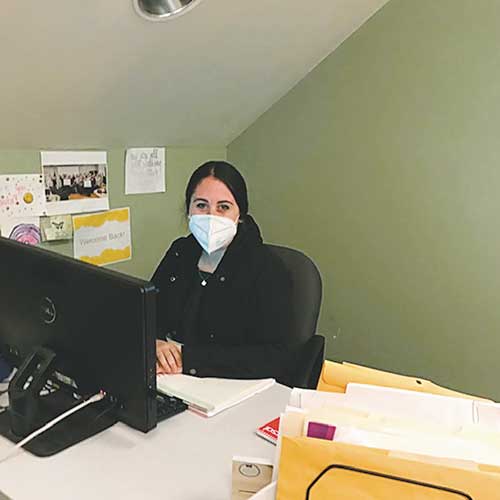Published November 26, 2020
By MICHAEL GEOFFRION SCANNELL

NORTH READING — There’s a job in town government that you may not know about. Laura Miranda, LMHC, is Mental Health/Substance Abuse Clinician from the North Reading Police Department and a member of the Community Impact Team.
Miranda will be hosting a free discussion next Wednesday, December 2 at 7 p.m. about self care and mental health during the changing seasons. Participants will learn the basics of what is commonly known as “seasonal affective disorder” or SAD, as well as ways to cope with these feelings.
It will be presented in a virtual format in collaboration with the Flint Memorial Library. Entitled: “From SAD to Glad: Resiliency Through Changing Seasons,” participants can register through CrowdCast at https://www.crowdcast.io/e/from-sad-to-glad/register
Flint Memorial Library Director Sharon Kelleher explained why she contacted Miranda about hosting such a program.
“Many people get depressed during the long winter months,” she said. “Couple that with the forced isolation of the pandemic and this year is going to be especially difficult. I reached out to Laura Miranda to collaborate on a program that would not only offer ideas for self-care but also to make sure residents know that North Reading has resources available to help them. We truly are in this together, and we have to lift each other up.”
In addition, the library plans to acquire full spectrum lights, which simulate sunlight and can be helpful to some who suffer from the disorder. Patrons will be able to check out the lights for use as home, just like any other library materials.
“Progressive” move for NRPD
Miranda is a licensed mental health counselor and holds a master of arts in clinical mental health counseling from Lesley University as well as a bachelor of arts in psychology from the University of Massachusetts-Amherst.
The counselor has clinical experience working with a wide variety of ages. She gained relevant experience through individual clinical work as well as running clinic-based mental health and substance abuse groups.
Miranda also has experience working in collaboration with the state Department of Mental Health, community-based agencies, schools, hospitals and collateral providers. She believes that all individuals have the right to access care that supports their mental health and/or substance abuse struggles. Since 2018, she has been working out of the Police Department to support the North Reading community in increasing awareness and access to mental health resources.
“One of my favorite aspects of this position is the many different ways it can be utilized by community members,” said Miranda. “In the context of the Police Department, the officers will respond to a mental health crisis or substance abuse-related call. With the community member’s permission, they provide me with the individual or family’s contact information, and I provide outreach to offer a further connection to services specific to their needs.”
Miranda works with the individual or family to find local resources that are accessible to them, and maintains contact as needed. Community members can also reach out to her if they are in need of assistance.
Miranda believes “having a mental health clinician in the Police Department is an extremely progressive and supportive offering to the community. I believe that the location of this position increases access to care, as folks are able to receive outreach shortly after a crisis or reach out to work to prevent one from occurring. The community has been very welcoming of this position.”
When asked what she does on a daily basis, she replied, “I appreciate this question, and understand the intention behind it. It’s important to me to be as general as possible to protect the privacy of those I have worked with.”
“Upon receiving the individual’s information from the responding officers, I reach out, ideally within one business day. A conversation is had, obtaining history and relevant information. From there, I draft a document with local resources relevant to their needs, and within the parameters of their health insurance, if applicable.”
She added, “Situation dependent, I will personally make a referral to a provider, agency or treatment center, or provide the individual with the resources to do so. Follow-up is offered or conducted to ensure wrap-around care. The process has a similar course if someone self-refers for support in coordinating their care.”
Miranda says that often folks are beginning the search for further care when they strongly need it, and the roadblocks that seem to pop up may only add to the challenges they face.
“Having the opportunity to see a snapshot of someone’s mental health journey from the beginning stages to maintenance has been the most rewarding for me thus far. I have to sneak in one more. Working in collaboration with other town departments and employees is very fulfilling and fun! It is great to see a town where partnership is not only valued, but encouraged,” she said.
When answering the question of which part of her job Miranda considers most difficult, she responds, “There are specific mental health and substance abuse challenges that lack more resources than others. This can be discouraging, especially when individuals are motivated for further care and are then met with difficulties in receiving it. I like to view this as an opportunity to advocate for an increase in services for these populations. To be frank, in my experience, there is an overt shortage of services for those struggling with discarding possessions due to holding an intense belief they need to hold on to them.”
Crucial connectiions
When she was told a coworker described her as “very empathetic,” she said, “Those are kind words. When we sit with another human being in their most vulnerable moments, I believe our strongest connections are made. When that connection is established, it becomes two people walking alongside each other, as opposed to one person navigating on their own. In the context of this working relationship, the individuals genuinely share the same goal of obtaining further help for the client. Working from a place of sincere intention has been beneficial in forming connections that lead to working together to get help for community members.”
Miranda also spoke of the contributions of library director Kelleher.
“The library has been a wonderful community partner to this role, and has been very supportive in collaborating to spread the message about mental health awareness,” she said. “Sharon wanted to bring a discussion on this topic to the community and reached out to inquire if I would facilitate – which I am very much looking forward to.”
Three-pronged approach
North Reading Police Chief Michael Murphy explained why he hired Miranda.
“Police are usually the first and last resort for situations involving mentally ill people and those with addiction,” he said. “Despite the critical role police officers play in the mental health safety net, the level and availability of training for police to handle these types of calls for service is not enough.”
The chief said it was critically important for his department to have a trained mental health/substance abuse clinician who would respond, conduct assessments, and make proper referrals and follow up services available to those suffering from mental health and substance illnesses. “This is critical also for the families of those struggling. It was a gap in our department and the town until we hired Laura in October of 2018,” the chief added.
Murphy noted that it is rare for a police department to have law enforcement, a prevention specialist and a mental health/substance abuse clinician working together, let alone under the same roof.
“We knew having that three-pronged approach could work, but success would only come if we hired the right person to fulfill the role,” he said. “Since coming on board, Laura worked alongside our officers and Drug Free Communities Director Amy Luckiewicz, creating a program from the ground up, with the goal of positively impacting the quality of life for those most vulnerable.”
Murphy added, “Laura’s personality, character and skill set were exactly what the program needed to succeed. She believes that all individuals have the right to access care that supports their mental health and/or substance abuse struggles and works tirelessly to make sure the need is met. Our department is grateful to have her.”
Luckiewicz, who also serves as vice chair of the North Reading Community Impact Team (CIT), explained that Murphy established the CIT in 2012. She said his goal was to get town departments and anyone who worked on quality-of-life issues to share resources and communicate about common challenges.
“Town departments have really pulled together to make sure we’re all focused on quality-of-life challenges,” said Luckiewicz. “Our volunteer base has grown immensely, and it’s clear that our volunteers really care about their neighbors.”
She and Miranda share an office at the police station to streamline the town’s substance use action plan by combining prevention services, treatment/resource services, and enforcement “all in the same house,” explained Luckiewicz. “It’s greatly facilitated communication and increased quick access to help for North Reading families. Usually when a family has a substance abuse challenge, it is first presented in a medical setting or (by) law enforcement. Now we can quickly get help not just for a person struggling with addiction, but their family too.”
“For years, we relied heavily on the police to get resources for families, and they did an amazing job,” added Luckiewicz. “Often NRPD officers would go beyond expectations, from finding a family a referral to recommending support groups, but their job is to protect us and to enforce the law. We really needed a person focused on finding the right referrals for families, and have access to that person full time. This means looking at insurance, logistics, and treatment preferences.”
“Laura specifically brings not just a strong knowledge base, but a level of compassion that is critical in creating a safe environment for someone who needs help to come forward. She also has an amazing ability to uncover a variety of options for the resident. Whether they need help with hoarding, depression, substance abuse or even self-care, Laura will find the right resource for the resident, and she’ll do it with an unparalleled level of empathy and kindness. Not every town has a Laura, but I wish they did.”
Miranda grew up in nearby Melrose. She and her husband reside in Stoneham and just welcomed their first, as she put it, non-fur baby in June. “I admit we may be biased,” she said, “but he is simply the best. Time has seemed to fly since his arrival.”




